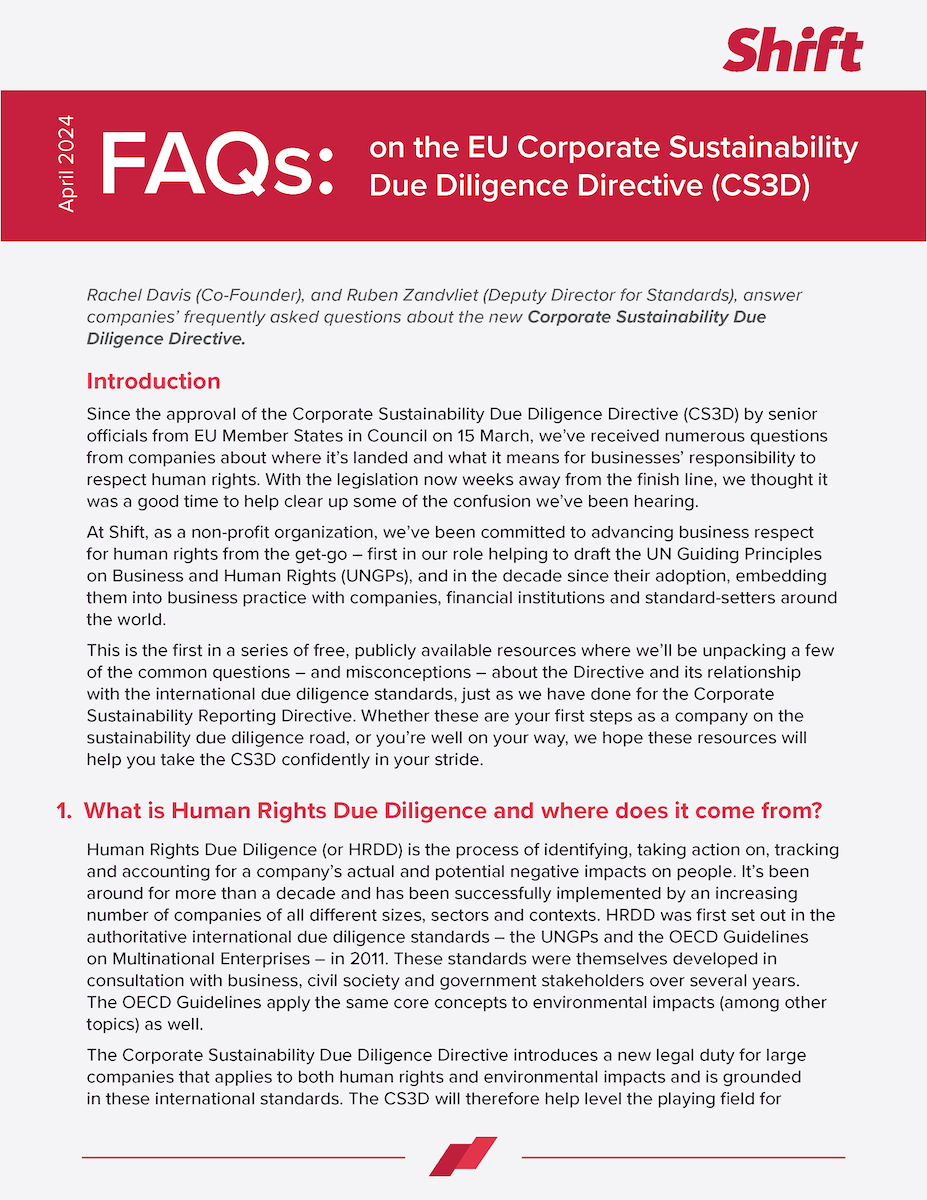Update: The draft guidance referred to in this Viewpoint was issued in final form by the IBA in June 2016.
Lawyers can play a critical role in helping their clients respect human rights – including their corporate clients.
Many lawyers from leading international law firms and in-house legal departments are already supporting their corporate clients’ efforts to implement the UN Guiding Principles on Business and Human Rights. Unfortunately, some lawyers remain unconvinced for a variety of reasons, including a lack of understanding about what the Guiding Principles mean and how they can apply to legal services.
Now, three years after the endorsement of the Guiding Principles by the UN Human Rights Council, the global voice of the legal profession, the International Bar Association, has issued draft guidance for legal professionals on the meaning and implementation of the Guiding Principles. The guidance:
- Outlines the content of the Guiding Principles;
- Describes its implications for bar associations worldwide;
- Explores the ways in which the Guiding Principles may be relevant to the advice and other services lawyers provide to their business clients;
- Recognizes the relevance of the Guiding Principles for law firms as business enterprises with their own responsibilities to respect human rights.
The guidance was developed by the IBA’s Business and Human Rights Working Group, of which I’m proud to be the chair.
So why should business lawyers read the guidance issued by the IBA? Six Reasons
- Risk management: A company’s failure to manage its human rights risks can have serious risks for the company itself, including legal risks. These risks include:
- Failure by the company’s board to meet its oversight and monitoring responsibilities for human rights risks;
- Failure by a company to honor its human rights commitments in a policy, code of conduct or in its contractual obligations;
- Difficulties to respond appropriately to changing judicial interpretations of the appropriate standard of care for managing human rights risks;
- Need to respond to potential enactment of more stringent legislation following severe human rights violations in a sector or country.
- Sustainability: Leading companies increasingly see the management of human rights risks as important to their sustainability objectives. They expect their most valued lawyers – both inside and outside counsel – to advise them on human rights as part of their broader management of legal risks.
- Changing law: The law is dynamic, not static. Laws requiring companies to respect human rights are increasing global, as seen most recently in legislation requiring reporting on human rights risks in the UK, EU and US, and criminal and civil lawsuits filed against companies worldwide. Non-governmental organizations also increasingly use the Guiding Principles for their advocacy in and out of the courtroom. This trend toward increasing use of the Guiding Principles in legal settings is expected to continue.
- Compliance and national law: Lawyers can play a critical role in helping companies comply with national law that protects human rights. Lawyers can also provide key advice to help clients understand and address potential tensions between national law and human rights.
- Prevention of human rights harm: There are many areas of legal practice where business lawyers have the ability to help a company to prevent or mitigate human rights problems, e.g., by shaping how a company selects, contracts with, monitors the performance of and terminates or renews its relationship with third parties who may have the potential to involve the company in human rights problems.
- Legal ethics: The Guiding Principles do not trump professional legal codes of conduct. The Guiding Principles were created with the expectation that lawyers should act in the best interests of their clients, and recognize that their role in upholding the rule of law is fundamental to the business’ responsibility to respect human rights. They do not disturb the confidential nature of attorney client communications. In fact, a number of legal codes explicitly mention human rights as a component of ethical lawyering. Furthermore, providing candid advice on the human rights risks of a legal transaction provides important context that can make the lawyer’s advice more valuable to the client. This is a key reason why the American Bar Association endorsed the Guiding Principles in 2012.
This new IBA guidance provides a systematic and balanced guide for business lawyers and bar associations worldwide on the implications of the Guiding Principles for their work. The guidance has been released in draft form in order to encourage comments and feedback through mid-2015. It will also be piloted by a number of national bar associations.
The guidance is a significant step forward in the discussion about the implications of the Guiding Principles for business lawyers. In order to serve the best interests of their clients, lawyers should pay close attention.
 By John F. Sherman III
By John F. Sherman III



